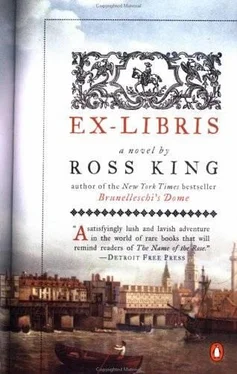'So to men like Abbott and Pembroke, and also to Villiers, the purpose was clear. Protestantism was wavering as never before, Mr. Inchbold, not only in Europe but in England as well. King James had lost the support of the Puritans, who no longer believed that his reign would bring about a true reformation of the Church. There was a real danger of a schism, of the Church of England breaking apart or collapsing from within-and of Rome seizing the moment of chaos to regain its lost ground. Looking back, I believe that the publication in 1611 of the Authorised Version of the Holy Bible was intended to impose conformity on English congregations, but of course it achieved the opposite effect, because suddenly every coney-cutter and wool-comber in England was convinced that he could preach the word of God. Protestantism began breaking apart, parish by parish, into numerous sects and separatist movements. So what was needed in 1617 was some masterstroke, a triumph, a daring strike at the heart of Spain's empire. Something that would unify the Protestants in their struggle against the twin powers of Rome and Madrid.'
I was stumbling along at his shoulder, attempting to follow these swirling currents and cross-currents as they flowed and receded, as they swept the Philip Sidney down the Thames to her secret destiny halfway round the world, among dense jungles and uncharted rivers, thousands of miles from competing factions and squabbling sectaries of England. I tripped on something, the fluke of a rusty anchor, and, righting myself, looked up to see London Bridge far in the distance, spread across the river behind the chimneystacks of Shadwell.
'The treasure fleet,' I whispered after a second, almost to myself.
'Exactly,' replied Biddulph. He had stopped walking and was gazing across the river towards Rotherhithe. 'Raleigh's ships were going in search of silver, not gold. That's why they were due to arrive in Tierra Firme in the dry season. Not so they could sail up the treacherous Orinoco in search of a gold mine that probably never existed in the first place, but to attack the annual silver fleet that was due to sail from Guayaquil to Seville. The whole fleet was probably worth as much as ten or twelve million pesos. Quite a sum-one that would pay for an army of mercenaries for the Palatinate or the Netherlands, or wherever else they might be needed.'
We had begun walking again, more slowly now, our hat brims pulled low against the sun. I tried to comprehend everything he now began telling me: that Raleigh's fleet was funded by desperate German princes poised on the brink of war, by Prince Maurice of Nassau, by English merchants hoping to expand their trade in Spanish America, as well as by assorted Calvinists in both England and Holland, all dreaming of a war of religion with the Spaniards, of driving Catholics from England, the Low Countries and the Empire in the same way that King Philip had driven hundreds of thousands of Moriscos from Spain only two or three years earlier.
'The capture of the fleet-or even its sinking-would also have sent ripples to every part of the Empire, every corner of the Catholic world. No Spanish fleet had been touched since the capture of the Madre de Dios in 1592. Even Drake'-he had turned round and was gesturing into the distance, across the river, with his stick, to where the Golden Hind sat in her dry-dock at Deptford-'even Drake had failed in his attempt to capture it in '96.'
Such was the bold plan, then. Led by the Philip Sidney , the fleet was to violate Raleigh's charter in the most spectacular fashion by attacking the annual convoy as it sailed from Nombre de Dios. The War Party believed that James would refuse to invoke the death clause in Raleigh's charter, not merely because Villiers and his faction would control the Navy Office as well as the court, nor even because Gondomar's influence would be waning as a result. The clause would not be invoked for the simple reason that-according to another clause in the charter-the greedy old King, the greatest spendthrift in Europe, was due to receive for his personal enjoyment one-fifth of whatever Raleigh might bring back in the holds of his ships: one-fifth of the treasures from the wealthiest convoy on earth.
But things went awry even before the fleet left Plymouth. Biddulph blamed the disaster not on the elements, not on ill fortune or poor planning, but on the Spanish spies and informers who infested Whitehall Palace and the Navy Office. It was known from documents smuggled out of Madrid that one of Gondomar's informers held an important post in the Navy Office, someone codenamed 'El Cid', or 'The Lord', which led Biddulph to believe that it was old Nottingham himself. So perhaps the silver fleet had been alerted to the danger well in advance. Perhaps it remained in Peru, in the harbour at Guayaquil. Or it could have sailed south, round Cape Horn, whose windy straits the Spaniards still controlled despite the recent depredations of the Dutch. Whatever the case, in the end Raleigh's fleet sailed towards the Orinoco instead of the promised riches of Nombre de Dios.
At this point in the voyage Biddulph was seeing Spanish agents and plotters everywhere. The so-called unprovoked attack on San Tomás by Raleigh's men was actually, he claimed, a clever plot aimed at discrediting the voyage in the eyes of King James, a well-planned conspiracy on the part of Gondomar's agents provocateurs , some of them on board Raleigh's ships, others stationed in San Tomás itself. Far from being fearful of an attack on a Spanish settlement in Guiana, Gondomar and the Spanish Party welcomed it, indeed provoked it. There was little for Raleigh to gain in Guiana and everything for him to lose, not least his head. Even more important, Villiers, Abbott and the whole War Party itself would be disgraced by the episode, while the Howards, Gondomar's bien intencionados , would once more be in the command of both the Navy Office and the King of England.
'But what became of the Philip Sidney after the fleet broke up?' I asked, wondering again how much of Biddulph's version-this tale of plots and counterplots-I should let myself believe. 'Captain Plessington wasn't in the party that raided San Tomás. Not that I've been able to discover.'
'And I doubt you will ever discover what Captain Plessington did,' Biddulph replied. 'Not even Bacon's inquiry could sort through all of the details. Nor, I believe, was it intended to,' he added with a sombre chuckle. 'The official story, of course, is that after the raid on San Tomás the fleet dispersed. It's known that Raleigh tried to talk his captains into attacking the Mexican treasure fleet, the one from New Spain that would be sailing from Veracruz. But in the end most of the ships followed the Destiny to Newfoundland, where they took on board cargoes of fish and then returned to England. Can you imagine the looks on the faces of the investors?' Biddulph was shaking his white plumicorns. 'Newfoundland cod instead of Peruvian silver! Imagine the indignation of the dukes and princes of Germany and Holland when they learned how their religion was to be preserved by nothing more than a few crates of salted fish!'
So tragedy mixed with farce as the princes of Europe slid towards the precipice. As the months passed, more and more couriers arrived at Lambeth Palace and the Navy Office. Vienna had been besieged by the Transylvanians; Transylvania had been invaded by the Poles; the Poles had been attacked by the Turks-a deadly cycle of blows and counterblows, a return of evil for evil. Europe had become a fanged beast catching hold of its own tail. Negotiations were repudiated, treaties went unratified. In Prague, two Catholic delegates to a convention of the Bohemian Estates were hurled from a window of the castle but survived because they landed in a dunghill. Their survival was taken by dévots across Europe as a sign from God. Other armies began buckling on their swords. Three comets appeared in the sky and astrologers took them as irrefutable proof that the world was about to end.
Читать дальше












